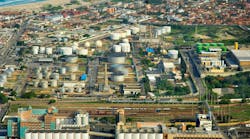Sahara Petrochemicals Co. has let a contract to Jacobs Engineering Group Inc., Pasadena, Calif., to provide general engineering services at Sahara’s various chemical businesses at Al Jubail Industrial City in Saudi Arabia’s Eastern Province.
As part of the 3-year contract, Jacobs will deliver engineering, procurement, construction supervision, project management, precommissioning, and commissioning support to a range of small to medium-sized capital projects for Sahara’s propane dehydrogenation, polypropylene, chloralkyl, ethylene dichloride, and peripheral utilities installations, Jacobs said.
Jacobs disclosed neither a contract value nor any additional details regarding the specific projects to be included in its scope of work at the petrochemical facilities.
Established in 2004, Sahara is a Saudi joint-stock company that, along with international joint-venture partners, owns, develops, builds, and operates petrochemical manufacturing sites in Al Jubail Industrial City, with its focus on production of ethylene, polyethylene, propylene, polypropylene, and their derivatives.
Sahara’s affiliates and holdings in Al Jubail Industrial City include the following:
• AL WAHA Petrochemicals Co., a JV of Sahara 75% and Basell Arable lnvestissements SAS 25%, that produces 467,600 tonnes/year of propylene as primary feedstock for the production of 450,000 tpy of polypropylene.
• Tasnee & Sahara Olefins Co. (TSOC), a closed joint-stock company owned by Sahara 32.55%, Saudi Arabia’s General Organization for Social Insurance 7%, as well as Tasnee Petrochemicals Marketing Co., National Gulf Co. for PetroChemical Technology, and National Worldwide Industrial Advancement Co. 60.45%, that serves as a holding company for other JVs 75% as well as Saudi Acrylic Acid Co. Ltd. (SAAC) 65%.
• Saudi Ethylene & Polyethylene Co. (SEPC), owned by TSOC 75% and BasellMoyen Orient lnvestissements SAS 25%, produces 284,800 tpy of propylene and 1 million tpy of ethylene, about 80% of which is used as primary feedstock for production of 800,000 tpy of high and low-density polyethylene (OGJ Online, Sept. 3, 2014).
• Sahara & Ma‘aden Petrochemicals Co., a 50-50 JV of Sahara and Ma’aden, that operates an integrated chloralkali plant to produce 227,000 tpy of chlorine and 250,000 tpy of caustic soda, and 300,000 tpy of ethylene dichloride.
• Saudi Acrylic Acid Co. (SAAC), owned by Sahara 22%, TSOC 65%, and Tasnee 13%, acts both as a holding company for investments in certain other JV projects as well owner-operator of all utilities and offsites for the integrated acrylates complex (IAC), including product storage and transportation and port facilities.
• Saudi Acrylic Monomer Co. Ltd. (SAMCO), owned by Sahara 75% and Rohm & Haas (Dow) 25%, operates the IAC’s acrylic acid and esters plant to produce 64,000 tpy of glycol acid and 160,000 tpy of butyl acrylates. As feedstock for the plant, SAMCO uses 96,000 tpy of n-butanol from SAAC, 100,000 tpy of propylene from SEPC, and 14,000 tpy of propylene from the S-Chem collective, which includes Saudi Chevron Phillips Co., Jubail Chevron Phillips Co., and Saudi Polymers Co.
• Saudi Acrylic Polymer Co., owned by SAAC 75% and Evonik 25%, operates an IAC plant where it produces 80,000 tpy of super-absorbent polymer from 64,000 tpy of glacial acrylic acid supplied by SAMCO and 24,000 tpy of dry caustic soda from Saudi Arabia Basic Industries Corp. or National Titanium Dioxide Co. Ltd.
• Saudi Butanol Co. (SABUCO), a JV of SACC 33.3%, Saudi Kayan Petrochemical Co. 33.3%, and Sadara Chemical Co. 33.3%, operates IAC’s butanol plant to produce 33,000 tpy of n-butanol that is supplied in equal proportions to SAAC, Saudi Kayan and Sadara based on their respective supply of propylene feedstock to SABUCO.
Contact Robert Brelsford at [email protected].
